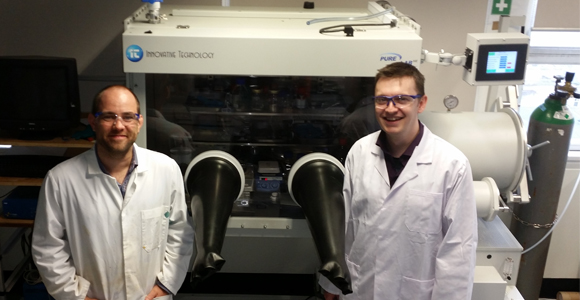In This Section
Micheál Scanlon begins chemistry research at UCC

Dr. Micheál Scanlon has been awarded a Science Foundation Ireland (SFI) Starter Investigator Research Grant (SIRG) and will return full circle to begin his independent research in the Chemistry Department at UCC under the mentorship of Dr. Colm O’Dwyer.
Micheál, a native of west Limerick, graduated with a BSc. in Chemistry from University College Cork (UCC) in 2005. Subsequently, on receiving an EMBARK Postgraduate Scholarship from the Irish Research Council for Science, Engineering and Technology (IRCSET), he undertook his PhD studies in electrochemistry at the Tyndall National Institute, Cork, under the supervision of Dr. Damien W. M. Arrigan (now at Curtin University in Perth. On graduating in 2009, he completed postdoctoral research on the topic of biosensors and biofuel cells as part of the FP7-funded “3D-nanobiodevice” consortium at the Materials and Surface Science Institute (MSSi) in the University of Limerick (UL) with Prof. Edmond Magner. From 2011 he was a postdoctoral researcher in the Laboratory of Physical and Analytical Electrochemistry at Ecole Polytechnique Fédérale de Lausanne (EPFL) in Switzerland with Prof. Hubert Girault.
Dr. Scanlon is a physical chemist, specialising in electrochemistry, with interests in utilizing liquid-liquid or “soft” interfaces as novel platforms for biosensor development, energy conversion & storage applications and materials self-assembly. He is the co-author of 27 peer-reviewed articles in journals such as ACS Nano, Chemical Science, Advanced Functional Materials, Langmuir, Analytical Chemistry and Electrochemistry Communications. Additionally, he has co-authored one book chapter on electroanalytical chemistry. He is the recipient of a number of awards, including the Reilly Prize from UCC in 2005 and the Ronald Belcher Memorial Lectureship from the Royal Society of Chemistry (RSC) in 2009. He is Member of the Royal Society of Chemistry (RSC), Institute of Chemistry of Ireland (ICI) and International Society of Electrochemistry (ISE) and is a referee for the peer-reviewed journals Electrochemistry Communications, Electrochimica Acta and Chemical Science.
Dr. Scanlon’s research project is entitled “Designing Reactive Functionalised Soft Interfaces – Self-healing soft materials for solar energy conversion, energy storage, and sustainable low cost hydrogen production.” In this project the suitability of liquid-liquid interfaces as an alternative platform for solar energy conversion and storage will be investigated and low toxicity water immiscible solvents, such as hydrophobic room temperature ionic liquids (RTILs), explored using a specialized miniaturized electrochemical apparatus. This is possible as liquid-liquid interfaces are easily functionalized with photoactive molecular sensitizers and semiconducting nanoparticles. Also, the photoproducts of a light-driven reaction can be separated on either side of the interface by the local hydrophobicity gradient, which can beneficially limit unwanted recombination pathways and thus potentially improve charge separation, a key parameter in solar cell design.
About the SFI SIRG Programme
The SFI SIRG programme is designed to support and develop early-career researchers with the greatest potential to become excellent, fully independent research leaders. The grant will allow Dr. Scanlon and one PhD student under his supervision to complete a fully funded structured research project using the support and infrastructure provided by the Chemistry department at UCC. Using this fantastic platform Dr. Scanlon may build his research capacity and expertise so that he may compete in other funding programmes such as those coordinated by the European Research Council (ERC) or through the Horizon 2020 framework. Additionally, Dr. Scanlon will gain valuable lecturing experience and is looking forward to raising the profile of science in Ireland through outreach projects.
School of Chemistry
Scoil na Ceimic
Contact us
Second Floor, Kane Building, University College Cork, T12 YN60
